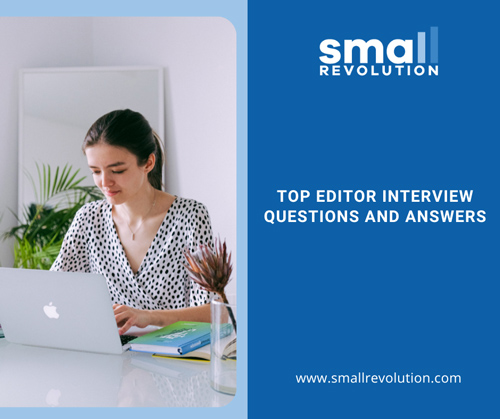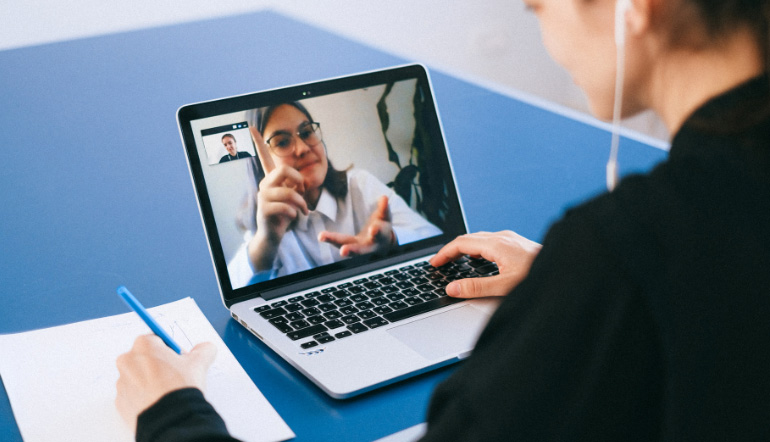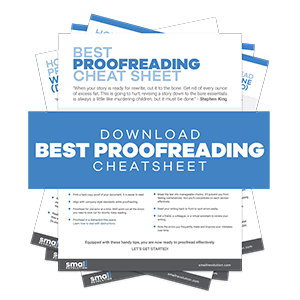Preparing for the editor interview process can be difficult. Even with a detailed job description or a briefing from a well-informed recruiter, candidates often have no idea what will happen during the interview.
To make matters worse, interviewers will ask a variety of questions that are designed to catch you off guard.
The good news is that you can anticipate some of these questions since they are frequently asked. Here are four top editor interview questions you’re likely to encounter:
- What do you know about our company?
- What motivates you?
- Why did you leave your previous company?
- Do you have any questions for us?
We’re going to delve into the interviewer’s motives for asking these questions and how you can best answer them.
Question 1: What Do You Know About Our Company?
It might seem logical to try and impress the recruiter with your statistical knowledge of their company.
However, the interviewer will probably get the same response from five other candidates quoting the same source.
Instead, focus your research on deeper aspects of the company to inform your answer:
- Why the company started and its mission
- The products or services it offers
- The company’s unique selling point
- Who the clients are
Follow this up with notes on the company’s accomplishments, such as recent awards or exciting new hires.
Achievements make excellent talking points and are a great way of showing your enthusiasm. For instance, mentioning that the organization received an award for one of their publications allows you to delve into the editorial process and what you love about it.
Possible Best Answers
- I appreciate your company’s mission to provide factual, unbiased information to combat misinformation and your commitment to making it available for everyone. I’m also glad that you received an award for your efforts.
- When I think of an industry leader, your organization immediately comes to mind. Your commitment to high-quality, in-depth business publications is unrivaled, which is why you are so well-liked by top clients.
Question 2: What Motivates You?
Motivated workers are less likely to:
- Take unnecessary breaks
- Miss project deadlines
- Make excuses
- Quit
They also genuinely enjoy working, which shows in their appetite for taking on new challenges.
Unfortunately, disengaged workers represent 87% of the global workforce, forcing companies to adapt their interviewing process to assess motivation levels.
Your response needs to convince the interviewer that you’re the motivated candidate they’re looking for.
So, talk about previous challenges and achievements. Mention a time you really struggled to edit a poorly-written piece, what you did to improve the piece, and the ways you were motivated to help the writer behind it grow and flourish.
Mention how the writer’s future articles showed results from your editing, and how that motivated you to keep working and editing more for other writers in your career.
Possible Best Answers
- I’m motivated by the challenge of finishing projects ahead of schedule. In my previous role, I was in charge of an editorial team tasked with coordinating online and print publishing cycles. I’m proud to say, we beat our deadlines every time.
- I adore the written language and can’t imagine doing anything else. I enjoy finding the right word to convey a point, simplifying complex ideas with easy flowing words that don’t change the meaning, and collaborating with writers on interesting topics.
- I’m a big fan of old-school editors like Robert Loomis, and am inspired by the prospect of one day working with an up-and-coming author to produce best-sellers.
Question 3: Why Did You Leave Your Previous Company?
Interviewers ask this question because employee turnover has massive business ramifications.
Did you know? Each departure costs roughly one-third of that work’s annual salary.
Meanwhile, editor positions, classified under professional and business services, have one of the highest turnover rates. The following table demonstrates this.
| Industry | Turnover Rate (2021) |
| Professional and business services | 64.2% |
| Education and health services | 37.3% |
| Financial activities | 28.5% |
Source: Bureau of Labor and Statistics
When the interviewer asks this question, your reply must inspire loyalty. You don’t want the interviewer to get the impression you’ll be leaving the company in a few months.
For example, tell the interviewer you left your previous company because you wanted to grow as an editor and face new challenges that the previous company didn’t offer you.
Turn these questions back onto the interviewer and ask if there is room for you to grow within their company and if you’ll be able to learn in the new job.
Avoid telling the interviewer you left the previous company because the pay wasn’t enough, because you were bored, or because you felt you weren’t a good fit for the team. If you tell the interviewer this, then why would they want to hire you?
Also, avoid telling the interviewer you’re looking for temporary placement while you find a better job or until you kick off your own business. This response suggests you won’t be loyal to the employer and so they won’t hire you.
Possible Best Answers
- I enjoyed my time with the company, but after four years, I’m ready for more responsibilities and challenges, which they couldn’t provide.
- My career goal has always been to advance to senior editing, where I can have a greater say in the topics we cover. After eight years as a junior editor, I felt I had gained enough experience to move on and learn more.
- In my previous position, I became aware of the persistent problem of misinformation, especially with political subjects that involve science. I want to do more to address this issue, but my previous employer does not cover political topics.
Question 4: Do You Have Any Questions for Us?
Interviewers judge candidates based on the type of questions they ask.
For instance, inquiries about minimum working hours or the number of leave days you’re entitled to may give the impression that you’re a slacker who only cares about how little work you can get away with.
Make an impression by asking questions that show you’ve done your research and want to learn even more about the company.
The best ones ask about the company culture, successful previous candidates, prospects, and growth opportunities.
Also, look at blog posts by the company and ask questions about them. Ask what they hoped to gain from a particular blog post, and if they give you an answer, tell them how you’d be able to help them reach that outcome through your editing.
Expert Tips: Never say that you don’t have any questions. It’s a weak response that demonstrates to interviewers that you’re not genuinely interested in the job.
Ensure that your questions can only be answered in person by the recruiter and aren’t easily covered by the company’s brochure, job description, and such.
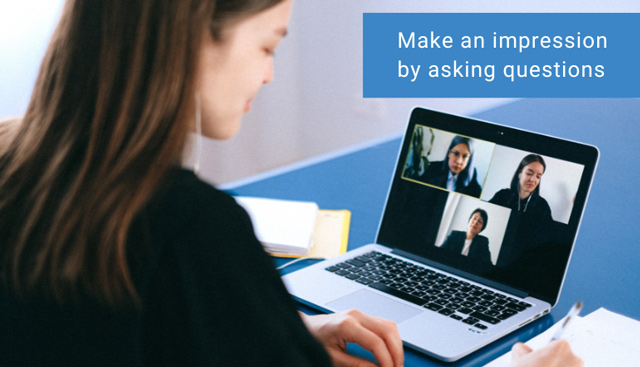
Possible Best Questions
- What happened to the previous editor and why did you hire him?
- What types of people succeed in this organization?
- Does the company encourage its employees to gain additional skills? If so, what kind of support is the company willing to provide?
- How does the editing department interact with others across the organization? Do people socialize outside of work?
- Is the company planning any mergers or acquisitions?
Stand Out With a Course From Small Revolution
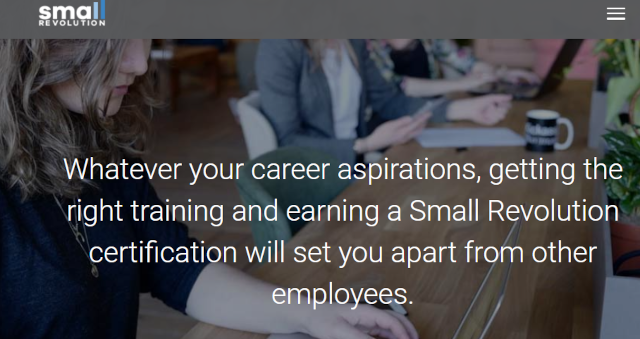
As online publishing continues to drive more people away from print, search engine optimization (SEO) has become a necessary skill for every editor.
Small Revolution gives you 10 years’ worth of real-world tools, techniques, and information packaged into a month-long course. You will learn:
- How to generate content ideas that rank highly on search engines
- How to use advanced search operators to complete your research faster
- How to use industry-standard tools like SurferSEO
Your platform does not only inspire individuals but it gives them the knowledge that only the most privileged people could manage to attain.
Loise, Small Revolution Graduate
Additional Preparation Tips for That Editor Interview
- Practice making eye contact. Pay attention to your eye contact during everyday conversations. Are your eyes fixed on the person you’re speaking with for a full thought? Can you avoid scanning the room?
Failing to look the interviewers in the eyes indicates nervousness or an exaggeration of the truth.
- Build the habit of good posture. In your next lunch meeting, practice sitting with your back straight, shoulders back, and your feet stably on the floor and not crossed.
A slouched posture or fidgeting can be interpreted as a lack of enthusiasm by the interviewer.
Share on Facebook:
